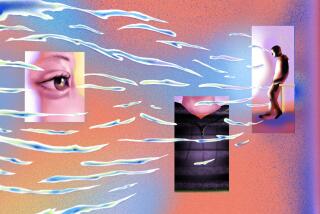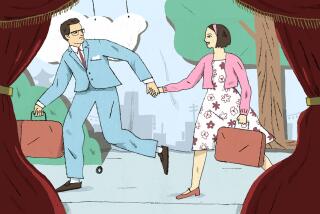Memories of the castle by a former Hearst chauffeur
San Simeon, Calif.
It had been nearly three decades since I stood in this spot, looking out across the Neptune Pool of Hearst Castle to the Santa Lucia Mountains.
But this time, the feeling was different. Thirty years ago, I had almost free run of this property, having been invited by Mr. and Mrs. William Randolph Hearst Jr. to spend a summer working here.
Prompted by Judy, my partner, I returned in 2005 as a tourist. But when my tour group was escorted into the castle, I stayed put, remembering my first time here.
How I came to be associated with the Hearsts is really about the kind of luck one needs when none seems near. I lived in New York. I was writing a book but was broke and desperate for work, so I decided to pass myself off as a chauffeur. Never mind that my driver’s license -- a British one at that -- had expired.
Somehow, Charlie, who ran a limo service, missed that. “What’s this?” Charlie half growled as I flipped my license across his desk.
“That, Charlie, is a British driving license,” I told him. “It entitles me to drive anywhere in the world.”
I was in. He told me to buy a chauffeur’s hat and wait for his call. It came an hour later when Charlie called to tell me to pick up a limo belonging to Mr. and Mrs. William Randolph Hearst Jr.
I thought he was joking. This was one of the richest, most powerful families in America. But he wasn’t kidding, so I did as I was told. I somehow managed to navigate the maroon Cadillac out of the garage and announced myself to their doorman.
Forty-five minutes later, the rear car door suddenly opened. A tall, attractive woman swept into the back compartment and said, “I’m Mrs. Hearst. Please drive me to L’Hermitage.”
I turned and faced her through the divider.
“That’s only round the corner,” I muttered. “You could have walked.”
Her mouth opened slightly. But she quickly recovered. “What’s your name?” she asked, imperiously.
“Geoffrey,” I told her.
“Then, Geoffrey, may I suggest you do the driving and I’ll do the talking.”
I maneuvered the couple of blocks to the restaurant without incident. A valet leaped forward, and Mrs. Hearst swept out just as she had swept in.
An hour or so later she swooped back into the limo followed closely by a distinguished-looking gentleman. This, I correctly presumed, was Mr. Hearst. “Take me to my office,” he said, giving me the address.
I deposited him there and returned the limo to the garage, hugely relieved.
To my astonishment, Charlie called me that evening to tell me Mrs. Hearst had requested me for the next morning.
Thus began a charming adventure working for the Hearst family. As my confidence grew, I settled into a comfortable relationship with them. They seemed to treat me like an eccentric member of the family.
Then one morning Mrs. Hearst said, “Geoffrey, how would you like to come to San Simeon with us for a couple of months?”
Next thing I knew, I was on a flight to San Francisco accompanied by Mrs. Hearst; Julia, the maid; and Jackson, Mrs. Hearst’s Jack Russell terrier. Julia and I drove to the Hearst estate in San Simeon, which was shrouded in fog. Despite the mists, I found my quarters at the Bunk House, which had a large room with a pool table, a dining area, several bedrooms and an outside area for barbecues.
With visibility down to about 40 feet, I felt claustrophobic. Only one thing to do: recon.
I set off in the Jeep, driving slowly through the blur. Suddenly, as if springing out of a black-and-white movie screen, six or seven wild-eyed zebras appeared, charging straight at my headlights. I sat dumbstruck as they skidded on the gravel, then vanished. I could hardly believe it. But this paled compared with what I saw next. Penetrating the fog, I instantly emerged into a brilliant, sun-filled blue sky. The fog became a flat carpet of white, rippling beneath me. In the distance, set into the foundations of this vast, milky sea, was a beautiful castle, the late-afternoon sun casting cathedral-like shafts of gold light on it. I parked the Jeep and began wandering. There were gushing fountains, white marble statues and flowers everywhere.
It is probably the closest to heaven I shall ever come.
Then I was arrested.
An angry barking roused me from my reverie. This sounded like trouble, so I took off for the Jeep. Too late. Four security men, official and decidedly unfriendly, appeared. I tried to explain I worked for the Hearsts, but they hauled me up to the castle, where they kept me for hours, despite my protestations.
When they finally found Mrs. Hearst, who was still in San Francisco, she vouched for me and they let me go.
There was no shortage of work to be done. Maintaining the vehicles, including an RV called the Blue Whale that we used for picnics. Clearing out warehouses and barns, cleaning horse tack and preparing for parties.
It was almost nonstop.
One morning, Mrs. Hearst led my assistant, Dale, and me to yet another barn. It was a mess. Hundreds of cobwebs, layers of dust, old furniture, abandoned pots and pans and a floor thick with grime.
Mrs. Hearst told us to clean up the place. Before leaving, she pointed to about 30 picnic chairs, half-covered with a dirty tarp, which was crawling with spiders. She said she wanted the chairs cleaned and stacked in a certain way. She left.
This was going to be one long day. But we shrugged and began scrubbing, rubbing, brushing and sweeping. Then we started on the chairs. When they were finished, I thought of an easier way to restack them.
As we were wrapping up from our long, tedious day of toil and trouble, Mrs. Hearst, dressed in her riding clothes and tapping her boots with a riding crop, appeared. The place was hardly recognizable. She took it all in.
“Marvelous,” she said, looking pleased. Then she lifted the now gleaming tarp to inspect the chairs.
Turning to me, she said, “Geoffrey, I specifically told you how to stack these chairs. You have deliberately disobeyed me. You must do them again.”
I held my temper but not my tongue. “Mrs. Hearst,” I replied, “you do them.”
I stalked out to the Jeep and drove the couple of miles back to the Bunk House and began a solitary game of pool.
I heard a vehicle pull up outside. Then Mrs. Hearst stormed into the pool room, Jackson at her heels. She was angry.
“Geoffrey, what on earth do you think you are doing?”
I forced myself to stay calm. “I’m leaving,” I said.
I walked out to my room, grabbed a bag and began packing. Footsteps outside. I saw Mrs. Hearst through the screen door standing by the barbecue, tapping her boots again with her riding crop. “Geoffrey, come out here immediately.”
I went, and we stood toe to toe. She was shouting, and Jackson, sensing the tension, began yapping.
It suddenly struck me as amusing. Here we were in the middle of 750,000 acres of some of the most glorious countryside in creation, having a row over a bunch of chairs.
She switched from screaming to pleading.
“Geoffrey,” she said, tearfully, “you can’t leave. Austin’s getting married, and we have so much to do.”
Tears melt my heart, and I wavered. Clearly, her outburst had nothing to do with the chairs or me. She was stressed out about something, and I was at hand. But I still wanted to make a point.
“Mrs. Hearst,” I said quietly. “It will take merely two little words from you to make me stay.”
She drew herself up to full height and said, “Geoffrey, I’m sorry.”
I stayed on till the end. Their son got married. There were no hard feelings.
My time with the Hearsts was an education of sorts. I realized that power and money tend to exclude people from certain essential aspects of life. Living in the cocoon of extreme wealth can bring as many disadvantages as it does privileges.
Before leaving that day, I drove Judy to Piedras Blancas Bay. The beach was flipper-to-flipper with elephant seals sunning themselves in the last warm rays of the afternoon sun.
They seemed content with their simple life.
So was I.
More to Read
Sign up for The Wild
We’ll help you find the best places to hike, bike and run, as well as the perfect silent spots for meditation and yoga.
You may occasionally receive promotional content from the Los Angeles Times.






